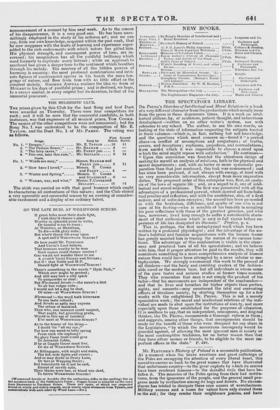NEW BOOKS.
Drrem.sc- 1 Dr.Pring's Sketches of Intellectual and 1 .... Longman and Co.
TUAL PH/L. I Moral Relations
P,.?LiTIL" ! Fletcher's History of Poland f Cochrane and nISTOR Y.. I • " *•" • • I. Pickersgill. FICTION.... G. P.51. James's Philip Augustus ..... 3 Vols. Colburn & Bentley. Tales of Welsh Land and Welsherie .. 2 Vols. Newman and Co. BIOGRAPHY Memoirs of Sebastian Cabot ot .......... ...... Hurst and ChilIIM LITRHARY t Payne Collier's History ot Dramatic 13 Vols. Murray. HISTORY .. ; Poetry, and Annals of the Stage..... .1
Colt's Lives of Players 2 Vols. Colburn& Bentley.
( Wade's Dwelling of Fancy, and other 1 j Cochrane and
POETRY....
1 Poems oems ) • l'ickersgill.
Reform Whittaker and Ca.
POPULAR i Paris and its Historical Scenes. (Li. 1 Knight. SERIES. ... ) brary of Entertaining Knowledge.).. I Humphrey Clinker. (Roscoe's Novel-1 f Cochrane and
hat's Library) 1 l Pickersgill. ( Hortus Duroverni. By \V. H. Musters, 1 BOTANY ... s iP.B.S. .j Longman and C. F
I Cochrane and
MAGAZINES The Metropolitan—for July
' • 1 Pick ersgill. The Englishman's Magazine—for July. Hurst and Chance
THE SPECTATOR'S LIBRARY.
DR. PRING'S Sketches of Intellectual and Moral Relations is a book of a very different character from the productions which usually issu.e from the press in these degenerate times. It is a work on intel- lectual philosophy, of acuteness, patient thought, and industrious development--written on no other writer's system, nor with reference to any school. The author, to use his own words, on looking at the state of information respecting the subjects treated in these volumes—which is, in fact, nothing but self-knowledge, and the questions which most concern us—found it "a perfect chaos—a conflict of assumptions and conjectures ; of truths, errors, and deceptions ; sophisms, prejudices, and contradictions;- from amidst which it was impossible to choose a creed upon which the mind might repose with satisfaction." He continues- " Upon this conviction was founded the chivalrous design of making for myself an analysis of relations, both in the physical and moral departments ; and, with no better or more systematic pre- paration than that just confessed, this task was commenced ; and has since been pursued, if not always with energy, at least with no very considerable interruption, except from more imperative duties. The proposed order of this enterprise was, first, an analy- sis of the laws of organic life ; and, as a sequel to it, one of intel- lectual and moral relations. The first was prosecuted with all the advantages of a professional pursuit, which derived aid from habi- tual practice and reflection, and with the confidence, also, of a first ardour, and of unbroken energies ; the second has been proceeded in with the hesitation, diffidence, and apathy of one who is not sure of his footing—who is sensible of his temerity in mingling his poor reflections with those of the greatest geniuses, and who has, moreover, lived long enough to suffer a considerable abate- ment of that enthusiasm which is only in full vigour before ex- perience of life has dissipated its illusions." Preface, p. v. This is, perhaps, the first metaphysical work which has been written by a profound physiologist ; and the advantage of the au- thor's .habitual and familiar acquaintance with the human frame has greatly assisted him in tracing the nature of its various func- tions. The advantage of this combination is visible in the clear- ness and practical turn of all his speculations ; and we believe with him, that if proper attention be paid to the results, they will contribute something to a more comprehensive analysis of human nature than could have been attempted by a mere scholar or me- taphysician. We strongly recommend this work to the perusal of all thinkers—not the hasty and rambling readers of the fashion- able novel or the modern tour, but all individuals in whom some of the pure tastes and serious studies of former times remain. They who remember that man is not simply the product of his tailor—that his movements are independent of the coachmaker- and that he lives and breathes for higher objects than parties, sights, and concerts—may counteract the fatal and enervating effects of frivolous. society, by shutting themselves up for a few weeks with the enlightened Dr. PRING. This is not a merely speculative work ; the moral and intellectual relations of the indi- vidual are made to abut upon the institutions of society, and more especially upon those established for the purposes of education. It is needless to say, that an independent, courageous, and Original thinker, like Dr. PRING, recommends a thorough reform in them; and suggests, among other things, that arrangements should be made for the benefit of those who were designed for any share in the Legislature, "by which the monstrous incongruity would be guarded against, of allowing the most ignorant men in society or the most contemptible tricksters, for no better reason than that they have either money or friends, to be eligible to the most im- portant offices in the state." P. 401.


























 Previous page
Previous page